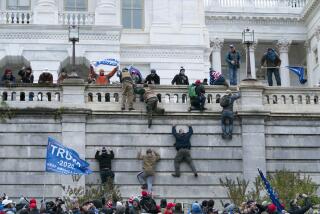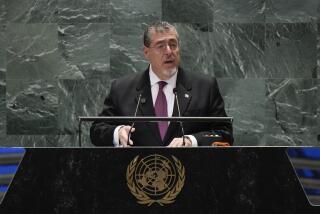Guatemala Democracy Is an Army in Disguise
- Share via
NEW YORK — Junior army officers attempted a coup against the government in Guatemala earlier this month; it was quickly put down without bloodshed by senior officers. Chief of Staff Brig. Gen. Hector Gramajo Morales, described the incident as “acts of indiscipline,” adding that the rebelling officers had “immediately changed their attitudes.”
The long-term legacy of the attempted coup will most likely be to reinforce the received wisdom among U.S. policy-makers that the senior military in Guatemala is loyal to civilian President Vinicio Cerezo Arevalo, that after many years of bloody army rule, Guatemala is the “most recent democratic success story in Central America,” in the words of Robert S. Pastorino, U.S. deputy assistant secretary of defense for inter-American affairs.
Pastorino’s happy assessment unfortunately bears little relation to the actual state of affairs. Civilian government in Guatemala is no more than a veil for military rule, operating as a shadow government from inside the civilian shell, and democracy an illusion dispensed for international consumption.
The genesis of the current arrangement in Guatemala lies not in the election of Cerezo in 1985, but in the 1982 transition from the ferocious military dictatorship of Gen. Romeo Lucas Garcia to the equally ferocious military dictatorship of Gen. Jose Efrain Rios Montt. The two regimes, together with the subsequent regime of Gen. Oscar Mejia Victores, appropriately earned Guatemala a reputation as the country most abusive of human rights in the Western Hemisphere.
By the end of direct military rule in Guatemala in 1985, the Guatemalan army had razed about 400 villages, killed or “disappeared” more than 100,000 people and driven hundreds of thousands more into exile or a political netherworld at home.
Having flattened the peasantry, the Guatemalan army found itself with a superb opportunity to consolidate its rule. The cost of open counterinsurgency war had been the loss of all international legitimacy; even the sympathetic Reagan Administration found it difficult to deliver military assistance because of the magnitude of Guatemala’s human-rights abuses. The army also had to consider its relationship with the private-sector oligarchy which, in its short-sighted struggle for profits, had helped precipitate the initial crisis and then had depended on the military for rescue, at considerable cost to the army in blood and resources.
Despite dependence on the army in time of crisis, once the emergency had passed the oligarchy resented the encroachment of the military into its traditional turf of economic power and policy. Members hoped that once the insurgent threat was over, the army would consider the battle won and allow the oligarchy to return to free reign.
The army, by contrast, had concluded that its own agenda was best served by the creation of a strong, authoritarian state; the military would dominate the popular sectors and peasantry through repression. It wanted power at least equal to the oligarchy--not just in security matters, but in economic policy as well.
This domination required that there be no relaxation of the national security state, plus the creation of permanent counterinsurgency mechanisms--principally, Vietnam-style model villages and the now-infamous “civil patrol” system whereby each village reports on its own activities and population directly to the army.
For the state to regain international legitimacy and thereby foreign assistance, however, the military rule had to be concealed beneath a veneer of civilian government. Thus the military, according to now-senior officers, planned for elections on its terms and in the context of its permanent counterinsurgency apparatus back at the time of transition from Lucas Garcia to Rios Montt.
Cerezo has pliantly served the military’s purposes. He has not opposed any of its operations to establish the country’s rural highland regions as a permanent military reservation. He has done nothing to stem an increasing tide of killings and disappearances in Guatemala City; he told a senior Catholic Church official, when confronted with a list of recently disappeared persons, that he would give the list to the army, because the list was “not within my jurisdiction.”
Although concrete figures are difficult to establish, human-rights observers believe the rate of selective human rights violations and abuse has steadily increased during 1987 and 1988, until it is now higher than levels reached in 1985 by the last military government prior to Cerezo. Political killings and disappearances have not abated in Guatemala under civilian government, although it is inconvenient under Cerezo to let the violence be as visible as it once was.
At the same time, Cerezo has brought international legitimacy back to Guatemala by providing a civilian surface for a military regime engaged in significant human-rights abuse. Although it was to be expected that the Reagan Administration would welcome any opportunity to send aid to the regime, even liberals in the U.S. Congress have willingly given military and police assistance--in part because they do not want to look beneath the surface. They have also wanted to give aid, however, as a reward for Guatemala’s foreign policy on Nicaragua; Cerezo’s government has generally not supported the Reagan Administration’s Contra efforts and has instead pushed for a regional diplomatic solution.
One staff assistant to a liberal congressman enunciated the position: “So long as Guatemala is on our side of the Contra issue, we will delegate to President Cerezo to determine what the country’s human-rights needs are, and if he wants police aid, he’ll get it.” This readiness to base the granting of military and police aid on Guatemala’s foreign policy is, unfortunately, an abdication of a basic principle of human rights--the willingness to look inside a regime to see how it treats its own people.
What U.S. policy-makers have refused to confront in Guatemala is that the military emerged victorious from its counterinsurgency war. The Cerezo government is ineffective on the essential issues less because the president is personally incompetent than because the military never ceded power. As one field commander put it at the time of Cerezo’s inauguration in Jan., 1986, “Don’t think that Cerezo is any different. He’s just the continuation of everything that’s gone on before.”
U.S. policy-makers will continue to misunderstand the nature of the regime in Guatemala--and will mistakenly approve military and police assistance--until they understand that the government is a military government. Its self-declared role is reflected not in the civilian presidential inauguration but instead in the comment of a colonel who, in January 1986, was found at his desk reading Machiavelli. The officer’s book shelf included Mao, Hobbes and Jeane J. Kirkpatrick. When asked why Machiavelli, he replied, “Now that the war has been won, we have to learn how to govern these people.”
More to Read
Sign up for Essential California
The most important California stories and recommendations in your inbox every morning.
You may occasionally receive promotional content from the Los Angeles Times.













